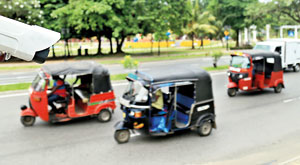News
Beware: Electronic eyes will record traffic offences

The cameras will be covering a larger area and will serve as a deterrent to motorists as they will not be aware from where the detection will be made. Pic by Anuradha Bandara
Motorists will soon have to be extra alert to avoid being nabbed for traffic offences when the Transport Ministry implements its plan to use footage from street CCTV cameras to fine offending motorists.
Special cameras that can easily read the number plates of vehicles will be installed on roads in addition to some 150 CCTV cameras already in place on main roads, junctions and around strategic buildings in Colombo city and suburbs.
Transport Ministry Secretary Nihal Somaweera said police would impose fines on the owner of the vehicle and send the ticket to the vehicle owner’s address as given in the registration.
“With this [CCTV] system it is difficult to impose the fine on the driver as the police will not be able to trace the driver. But the vehicle owner can be detected easily through the Motor Traffic Department,” Mr. Somaweera said.
The vehicle owner could pay the fine through a post office.
“In the event the fine is not paid at the end of the year the vehicle owner will have to pay up when the revenue licence has to be extended. The details of the fines will be conveyed to the Divisional Secretary’s office,” Mr. Somaweera said.
Some vehicle owners currently hold “open papers” without registering the vehicle. Mr. Somaweera said the ministry would give a grace period in which to register these vehicles. “We plan to increase the fines for vehicles that are not registered,” he added.
Mr. Somaweera said the CCTV proposal was introduced to improve road discipline, reduce vehicle congestion and minimise accidents and inconvenience to the public.
“The cameras will be covering a larger area and will serve as a deterrent to motorists as they will not be aware from where the detection will be made,” he added.
He said existing laws were sufficient but if necessary more laws or amendments will be introduced. 
Deputy Inspector General of Police (Traffic) Amarasiri Senaratne said the vehicle owner facing a fine would be provided with the opportunity to review the camera recordings before paying the fine and those facing fines would also have the option to resort to court action.
DIG Senaratne said that it was impossible for the police to physically cover a large area as they are mostly stationed on main roads and junctions, and the camera system would help to take action against those committing offences on smaller roads. Traffic congestion on main roads are often caused by motorists who parked carelessly on byroads, he said.
DIG Senaratne said the change would affect bus drivers who are supposed to use the left-hand lane but who routinely violate this law, avoiding penalty by quickly returning to the left lane when they see a policeman on duty. “‘This will not be possible with the new system in place,” he said.
DIG Senaratne said police have proposed that when registering the vehicle the owner should be required to provide a Grama Sevaka certificate to establish his or her address, which would enable police to contact an owner over an offence.
The move to introduce the new system is likely to cause concern to people who rent out vehicles for short periods. These would include three-wheeler drivers who pay a daily fee to the owner to take the vehicle out on hire.
Sri Lanka has a high road toll with an average of eight deaths a day from traffic accidents. During the first five months of this year, 1,161 people were killed in accidents.

